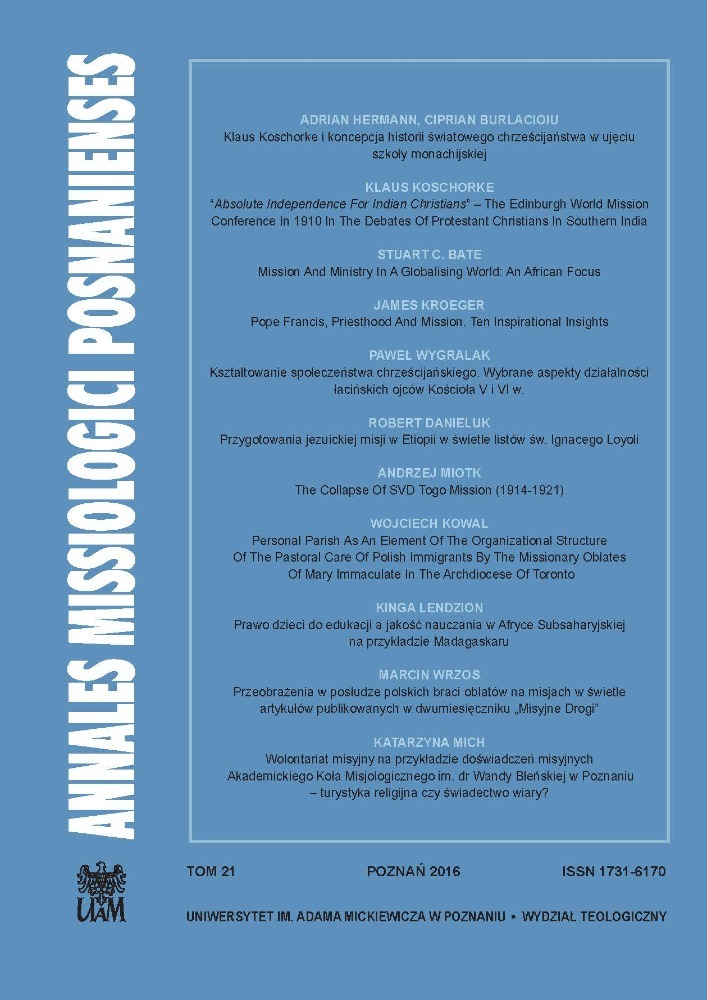Abstrakt
In 2003 Madagascar joined the UNESCO “Education for All” programme. The primary objective of the programme is to improve accessibility to and the quality of the education system. Although there has been progress in achieving universal primary education, this progress has not been accompanied by the necessary safeguards for ensuring quality of education. According to the UNESCO report “Éducation pour tous. Madagascar 2015" only 79% the Malagasy children who started school went on to complete their primary education. The PASEC (Program on the Analysis of Education Systems) report also shows the low quality of education – children repeating school years together with low educational outcomes in Mathematics and French. This poor quality of education is undoubtedly in violation of the rights of children to their individual development. This article attempts to answer the question about the causes of the low quality of education in Madagascar. According to the author it’s important to note that apart from poverty and child labour the low professional qualifications of teachers is also a contributory factor.Bibliografia
Deleigne, Marie-Christine. „La mesure statistique et ses limites : l’exemple du système scolaire malgache”, Cahiers de la recherche sur l’éducation et les savoirs [En ligne], 3 | 2004, mis en ligne le 01 septembre 2012, consulté le 07 juillet 2015. URL: <http://cres.revues.org/1395>
Deleigne, Marie-Christine. „Vers l’institutionnalisation de l’École dans l’Androy (Madagascar) ?”, Cahiers de la recherche sur l’éducation et les savoirs [En ligne], 8 | 2009, mis en ligne le 22 mars 2012, consulté le 13 mai 2015. URL: <http://cres.revues.org/603>
„Enquête nationale sur le travail des enfants à Madagascar 2007”, INSTAT. Dostęp 30.05.2015. <http://www.instat.mg/pdf/ente_2007_poly.pdf>
„Enquête National sur le suivi des indicareurs des OMD, (2012-2013)”, Objectif: 2, INSTAT: XI. Dostęp 30.05.2015. <http://www.instat.mg/pdf/ensomd-2012-2013_2.pdf>
„Enquête National sur le suivi des indicareurs des OMD, (2012-2013)”, Objectif: 4, INSTAT: 7-8. Dostęp 05.07.2015. <http://www.instat.mg/pdf/ensomd-2012-2013_4.pdf>
Gastineau, Bénédicte. Ravaozanany, Noro. „Genre et scolarisation à Madagascar”, Questions Vives [En ligne], Vol.8 n°15 | 2011, mis en ligne le 10 octobre 2011, consulté le 23 avril 2015. URL: http://questionsvives.revues.org/710; DOI: 10.4000/questionsvives.710.
LOI n° 2008-011 modifiant certaines dispositions de la Loi n° 2004-004 du 26 juillet 2004 portant orientation générale du Système d’Education, d’Enseignement et de Formation à Madagascar. Dostęp 01.06.2015. <http://www.unesco.org/education/edurights/media /docs/23c8485998e09 3c6fbdd2d345ffec368c76d5620.pdf>
Milenijne Cele Rozwoju ONZ, Ośrodek Informacji ONZ w Warszawie. Zob. Dostęp 01.07.2015. <http://www.unic.un.org.pl/cele.php>
Nivo, T.A. „75% des enseignants payés par les parents d’élèves.” Madagascar-Tribune.com (opublikowano 10 listopada 2008). Dostęp 30.06.2015. <http://www.madagascar-tribune.com/75-des-enseignants-payes-par-les,9833.html>
PASEC. „Quelques pistes de réflexion pour une education primaire de qualité pour tous. Rapport Madagascar 2008”. Programme d’analyse des systèmes éducatifs de la CONFEMEN, www.confemen.org
Rakotonandrasana, Marc. „Madagascar - Enseignants recrutés sans formation initiale”. Dostęp 30.05.2015. <http://www.ciep.fr/sources/conferences/CD_professionnalisation/bak/ pages/docs/pdf_pays/Madagascar.pdf>
„Rapport Final. Evaluation externe du programme RSTEP (Renforcement des Sciences et Techniques dans l’Enseignement Primaire à Madagascar)”. Rakotozafy Harison, Jean Baptiste. Hofmann, Elisabeth. Antananarivo/Bordeaux, 2010. Dostęp 02.06.2015. <http://www.ongdefi.org/docs/evaluations /Evaluation_Mad_2010.pdf>
„Rapport sur les enfants travaillant à Madagascar 2011”. Ambassade des Etats-Unis d’Amerique. Antananarivo – Madagascar. Dostęp 28.05.2015. <http://french.madagascar.usembassy.gov/root/la-relation-americanomalgache2/rapport-sur-les-enfants-travaillant--madagascar-2011.html>
Ratsiazo, Léa. „Baisse spectaculaire du niveau des élèves.” Madagascar-Tribune.com (opubliowano 29.09.201014). Dostęp 30.05.2015.
<http://www.madagascar-tribune.com/Baisse-spectaculaire-du-niveau-des,20291.html>
Ratsiazo, Léa. „Les maîtres FRAM encore et toujours en difficulté.” Madagascar-Tribune.com (opublikowano 6 stycznia 2015). Dostęp 30.05.2015. <http://www.madagascar-tribune.com/Les-maitres-FRAM-encore-et,20655.html>
UNESCO. „Examen national 2015 de l’Éducation pour tous. Madagascar”, <http://unesdoc.unesco.org/images/0023/002317/231749f.pdf.
Licencja
Prawa autorskie (c) 2016 Kinga Lendzion

Utwór dostępny jest na licencji Creative Commons Uznanie autorstwa – Bez utworów zależnych 4.0 Międzynarodowe.
PRACE PUBLIKOWANE W CZASOPIŚMIE DOSTĘPNE SĄ NA LICENCJI CREATIVE COMMONS:
Przed 2006 do wszystkich tekstów opublikowanych prawa autorskie są zastrzeżone.
Autorzy
Autorzy tekstów przyjętych do publikacji w czasopiśmie Annales Missiologici Posnanienses są zobowiązani do wypełnienia, podpisania i odesłania na adres redakcji umowy o udzielenie nieodpłatnej licencji do utworów ze zobowiązaniem do udzielania sublicencji CC.
Zgodnie z umową, autorzy tekstów opublikowanych w czasopiśmie Annales Missiologici Posnanienses udzielają Uniwersytetowi im. Adama Mickiewicza w Poznaniu niewyłącznej i nieodpłatnej licencji Creative Commons Attribution-NonCommercial-NoDerivatives 4.0 International (CC BY-NC-ND 4.0) oraz zezwalają na sublicencje na tych samych warunkach.
Autorzy zachowują prawa do dalszego, swobodnego rozporządzania utworem.
Użytkownicy
Zainteresowani użytkownicy internetu uprawnieni są do korzystania z utworów opublikowanych od 2021 roku w Annales Missiologici Posnanienses pod następującymi warunkami:
- uznanie autorstwa – obowiązek podania wraz z rozpowszechnionym utworem, informacji, o autorstwie, tytule, źródle (odnośniki do oryginalnego utworu, DOI) oraz samej licencji;
- użycie niekomercyjne – nie należy wykorzystywać utworu do celów komercyjnych;
- bez tworzenia utworów zależnych – utwór musi być zachowany w oryginalnej postaci, nie można bez zgody twórcy rozpowszechniać np. tłumaczeń, opracowań.
Zainteresowani użytkownicy internetu uprawnieni są do korzystania z utworów opublikowanych w latach 2006-2020 w Annales Missiologici Posnanienses pod następującymi warunkami:
- uznanie autorstwa – obowiązek podania wraz z rozpowszechnionym utworem, informacji, o autorstwie, tytule, źródle (odnośniki do oryginalnego utworu, DOI) oraz samej licencji;
- bez tworzenia utworów zależnych – utwór musi być zachowany w oryginalnej postaci, nie można bez zgody twórcy rozpowszechniać np. tłumaczeń, opracowań.
Inne
Uniwersytet im. Adama Mickiewicza w Poznaniu zachowuje prawo do czasopisma jako całości (układ, forma graficzna, tytuł, projekt okładki, logo itp.).


